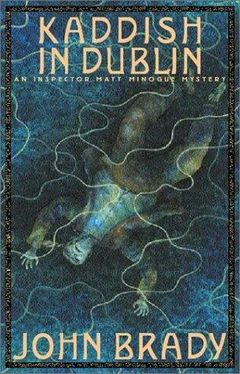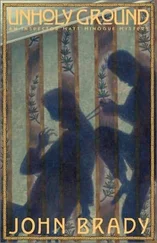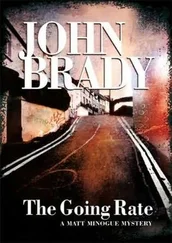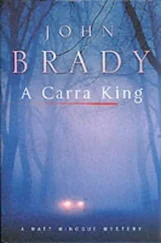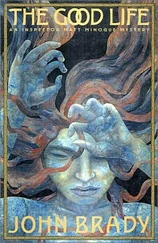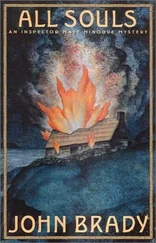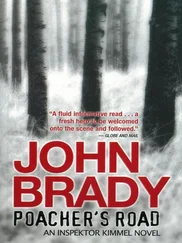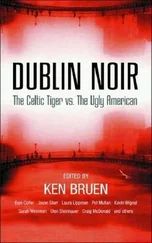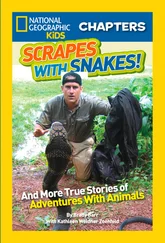John Brady - Kaddish in Dublin
Здесь есть возможность читать онлайн «John Brady - Kaddish in Dublin» весь текст электронной книги совершенно бесплатно (целиком полную версию без сокращений). В некоторых случаях можно слушать аудио, скачать через торрент в формате fb2 и присутствует краткое содержание. Жанр: Полицейский детектив, на английском языке. Описание произведения, (предисловие) а так же отзывы посетителей доступны на портале библиотеки ЛибКат.
- Название:Kaddish in Dublin
- Автор:
- Жанр:
- Год:неизвестен
- ISBN:нет данных
- Рейтинг книги:5 / 5. Голосов: 1
-
Избранное:Добавить в избранное
- Отзывы:
-
Ваша оценка:
- 100
- 1
- 2
- 3
- 4
- 5
Kaddish in Dublin: краткое содержание, описание и аннотация
Предлагаем к чтению аннотацию, описание, краткое содержание или предисловие (зависит от того, что написал сам автор книги «Kaddish in Dublin»). Если вы не нашли необходимую информацию о книге — напишите в комментариях, мы постараемся отыскать её.
Kaddish in Dublin — читать онлайн бесплатно полную книгу (весь текст) целиком
Ниже представлен текст книги, разбитый по страницам. Система сохранения места последней прочитанной страницы, позволяет с удобством читать онлайн бесплатно книгу «Kaddish in Dublin», без необходимости каждый раз заново искать на чём Вы остановились. Поставьте закладку, и сможете в любой момент перейти на страницу, на которой закончили чтение.
Интервал:
Закладка:
“You mean that it’s not certain that Brian Kelly didn’t take his own life?”
“Not entirely at all, Your Eminence. His is in a category of ‘suspected foul play’. It’s likely that we’ll want to investigate the death as soon as we have gleaned all the information we can from a forensic investigation of the remains. I expect that Brian’s death will be a murder investigation by midday tomorrow.”
“It’s a question of what the books call Forensic Pathology, Frank,” said Tynan mildly. “The body was very badly burned.”
Burke rubbed his eyes again. “But the gist of what you were wanting this morning was something else, wasn’t it, though?” he said laboriously, as though to a duller student.
Minogue’s chest was tight with alertness. Something was forming in his mind, quicker now, but he could not make out the contours.
“If I might know which members of Opus Dei are in the Gardai or the Army,” he said.
“And why?”
“There are clues to suggest that Paul Fine’s murder may have involved a person who is both an expert in firearms and had access to same. The murderer went to a lot of trouble to remove evidence from the murder site. It’s also apparent that the phone call to the newspaper blaming it on Palestinians may have been a hoax.”
Burke glared at Minogue with reddened, rheumy eyes. “Do you know anything about Opus Dei, Inspector? You, John,” he turned to Tynan, “you know a bit.”
“Little enough, Your Eminence. I believe that they are not directly accountable to their local dioceses, the local church hierarchy, I mean. They don’t advertise themselves. Naturally one has to be very devout to join-”
“And make no mistake about that,” Burke interrupted. His vehemence startled Minogue. “It’s not that they’re not accountable. They work within their own structure, parallel to our own diocesan work. We’re all pulling in the same direction, you know. The Church is involved as a social agency in a huge number of projects, Inspector. God comes to us in Tallaght, in Clondalkin where boys and girls sniff glue from bags in ditches; God is in the employment office where there are men who haven’t found work in ten years; God is meals-on-wheels to old people that our consumer society has no more time for. Commitment. Values. Altruism. Service. We’re all after the same goals: to serve God by serving our fellow-men and women in this world.”
Burke pointed a finger at the ceiling. “We’re after the will to carry things through, to resist the blandishments of the style of living we seem to have such appetites for now. You won’t shock me to tell me we’re not the Island of Saints and Scholars, but let me tell you this. The will to persevere amidst Ireland’s social upheavals is not the exclusive preserve of the well-intentioned. There is a will to do evil too. Our will is allied to and founded upon values we all hold dear, in the Church, in Irish history as a whole and it’s allied to the commitment that Irish people have shown throughout our history.”
Saints and scholars, like Kilmartin’s dreams. Was everybody in this damn country always ready to deliver a speech at the drop of a hat, Minogue wondered. Perhaps there was some threat in Minogue to which people responded by speechifying. Out of the corner of his eye he knew that Tynan was sitting still, but that it was not a stillness of relaxation. Had Tynan known it would turn out like this?
“Our faith; our culture; our people; our children’s future; altruism: where will you find any of that these days, I sometimes ask myself in my most dispirited moments,” Burke continued in a low voice. “Short supply, hmm, John?” He darted the remark to Tynan.
Tynan nodded.
“So it troubles me to hear criticism of Opus Dei when I know that its membership shows these qualities. Though they may have any and all the failings which flesh is heir to, and I’ll certainly second that,” said Burke.
Minogue wanted to protest; to say he was not being snide about Opus Dei, to say that even policemen could understand context and motives. He saw it would be useless. Any explanation would have the cast of an excuse now. Qui ’s‘excuse,’s’accuse. What had probably gotten Burke’s goat was the suggestion that there was some connection between Opus Dei and Paul Fine’s body gently drifting in off the Irish Sea. But why did Burke appear to be resigned now, after starting out so tough?
“You know, I read the paper this morning and I saw something I didn’t believe. No, it wasn’t the fact that thousands of people, poor people the most of them, are without a way to travel by public transport and carry on their lives in a reasonable manner. No, it was something even more distressing. I had Father Sheehy phone up the Irish Times and confirm the sources and I’m afraid the figures seem to be true. There are over 150,000 Irish people, all young men and women, working illegally in the United States.”
Daithi. Minogue watched the Archbishop’s eyes get bigger. Daithi wanting to be away from this. At least he’s resisting in the only way he knows will work. Fled the place.
“ One hundred and fifty thousand people! Nearly fifty thousand people a year are leaving our shores. We’re on the brink of a new millennium: there’s no famine any more to excuse us. Except there is a different kind of a famine or a hunger abroad on the land. A blight of a different order, a decay.”
Burke’s flowing allusions seemed to tire him completely now. His chin sank on to his chest and he stared balefully at the desktop.
“Do you see what I’m getting at?” he said suddenly to Minogue.
“I think I do, Your Eminence. I worry about our two at home,” Minogue conceded.
“Scattered,” Burke said as though spitting the word out. “Our young people are being scattered all over the world. It’s worse than the English ever did to us. It’s as bad as when we were persecuted for our faith. The ones that stay are often cynical and they turn inside themselves, they hold on to their jobs and they try to forget about things. Being cynical is a way of containing fear, isn’t it? Remember the rows we used to have in the lectures, John? I enjoyed them so much. I always remember you above the others, you were so full of fight.”
Burke’s features softened at the memory.
“Your Deputy Commissioner Tynan here had a very good understanding of the foundations of religious belief, Inspector. It takes a lot of nerve not to be a cynic. The youth that are leaving, even if they come back from America and the Continent, they’ve seen that things are not the same. Their faith is tested abroad and doubly so when they return. Few can come through the ordeals of unemployment and emigration unscathed.”
Should Minogue tell him that he’d rather see Daithi restless, and even cynical, than have him stay and become a credulous sycophant in Opus Dei? The authentic over the sincere any day, Burke: I’d pay the price.
“I suppose policemen’d know more about the drugs and the alcoholism,” said Burke. “Contrary to what the media might like to say, the Church does not turn a blind eye to child abuse or wife abuse either. They’re symptoms of the same disorder and what do we have now but further signs of crisis even in rural Ireland, when a married woman with a family of young children kills her husband rather than find another solution? Making orphans of her children, instead of using the law of the land to get help? Of course there’ll always be agitators who can go home to clean, warm homes far from County Tipperary and cheer for murder after breakfast.”
That was enough to tip Minogue’s gargoyle over the brink.
“Manslaughter, Your Eminence.”
“Pardon, Inspector?”
“Mrs. Ryan is charged with manslaughter.”
Читать дальшеИнтервал:
Закладка:
Похожие книги на «Kaddish in Dublin»
Представляем Вашему вниманию похожие книги на «Kaddish in Dublin» списком для выбора. Мы отобрали схожую по названию и смыслу литературу в надежде предоставить читателям больше вариантов отыскать новые, интересные, ещё непрочитанные произведения.
Обсуждение, отзывы о книге «Kaddish in Dublin» и просто собственные мнения читателей. Оставьте ваши комментарии, напишите, что Вы думаете о произведении, его смысле или главных героях. Укажите что конкретно понравилось, а что нет, и почему Вы так считаете.
